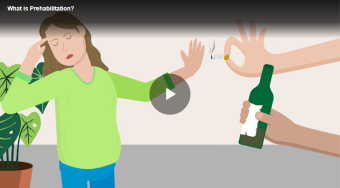This page explains what prehabilitation and rehabilitation are, and has specific advice about exercise and activity, nutrition and diet, feeling tired, stopping smoking, and how to get support with this.
What is prehabilitation?
Starting treatment for cancer can be daunting, and you may feel like you don’t have control. There are things you can do before you start. This can include making slight changes to your everyday life to help get ready for cancer treatment. This is called prehabilitation, or prehab.
Prehabilitation helps people living with cancer prepare their body and mind for treatment. It can include thinking about your physical activity, healthy eating, mental health, alcohol intake and stopping smoking.
Find out more by watching these videos from Macmillan Cancer Support have information about prehabilitation: Prehabilitation videos for people living with cancer | Macmillan Cancer Support
Your cancer clinical nurse specialist or cancer support worker can provide you with more support, advice, and referral to specialist prehabilitation services.
Find out more information below about different aspects of prehabilitation and how to find support from local services below.
What is rehabilitation?
Recovery during and after treatment is called rehabilitation. Cancer and its treatment may cause physical and psychological issues which can affect your quality of life and everyday tasks. There are things you can do to support your recovery.
Your cancer clinical nurse specialist or cancer support worker can provide you with more support, advice and if needed a referral to specialist rehabilitation services. You can access support at any point in your cancer journey for symptoms or concerns including:
- Tiredness.
- Difficulty moving, standing, walking or going up and down stairs.
- Weakness.
- Reduced joint movement, stiffness or swelling.
- Breathlessness
- Pain.
- Incontinence.
- Difficulty concentrating.
- Weight or appetite changes.
- Difficulty with swallowing or talking.


